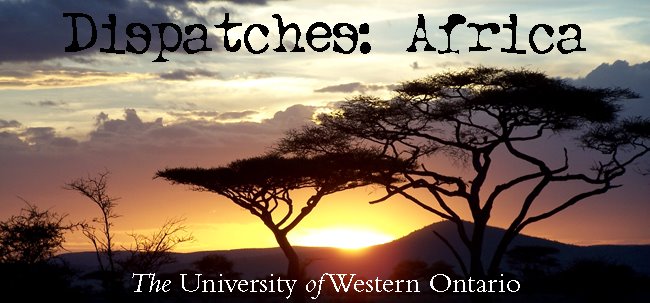 Mwanza, Tanzania - As large raindrops begin to fall from a darkening sky, one of our host’s daughters reached up and silently took my hand in a sign of friendship as we made our way downhill through a small Mwanza community where we had had lunch. It was a sweet moment on a day that really featured a true experience in Africa that most tourists don’t have the opportunity to enjoy.
Mwanza, Tanzania - As large raindrops begin to fall from a darkening sky, one of our host’s daughters reached up and silently took my hand in a sign of friendship as we made our way downhill through a small Mwanza community where we had had lunch. It was a sweet moment on a day that really featured a true experience in Africa that most tourists don’t have the opportunity to enjoy.Meaghan, Alison and I had been invited to lunch by the interns’ housekeeper, Pendo, at her mother’s home a distance out of town. Making our way first to Pendo’s place, we were greeted by a succession of children – some hers (she has eight), some her sister’s and some her friend’s – in a small dark, teal room with a set of shuttered windows and a curtain that had been pulled across to separate bedroom from living room. Leaks in the ceiling were like large cup rings on a coffee table. Chairs and couches quickly filled as children came in, saying the respectful “shikamoo”. They seemed very excited to be having us as guests and quickly brought out a box of photographs and showed us their English homework. None of them spoke it much at all.
They were, however, quite eager to have their “picha” taken and would laugh with delight – and rib each other mercilessly – when we’d show them their facsimile selves on the backs of our cameras. The whole day, they’d point out photo opportunities and often stepped behind the shutter themselves. It was a nice change from having to be so careful about respecting cultural values here, where you don’t just randomly take pictures of people.
Eight children of various ages, the three of us and Pendo each piled into a dala-dala (a small mini-van-like bus) for the 25-minute ride to our destination. Stuffed beyond capacity, there were at times more than 25 sweaty people in the vehicle. And a basket of live chickens. This is Africa.
With the children leading the way and carrying a large basket of cooking bananas, vegetables, wood and other cooking supplies, we made the 20-minute trek up into the hills to Pendo’s mother’s home. The dirt ground in front of the relatively-large house was impeccably swept and out of small gardens sprouted plants that folded unto themselves when touched.
 As one child flicked impatiently though stations on a large radio, another showed off his dancehall moves; others began preparing the food and yet another box of photographs was brought out. The children eagerly pointed out themselves and their parents. Pendo’s mother brought out a large bag of plaited straw and taught the interns how to make intricate patterns that could eventually be woven together into large mats.
As one child flicked impatiently though stations on a large radio, another showed off his dancehall moves; others began preparing the food and yet another box of photographs was brought out. The children eagerly pointed out themselves and their parents. Pendo’s mother brought out a large bag of plaited straw and taught the interns how to make intricate patterns that could eventually be woven together into large mats.Lunch, made on a small portable stove outside, was cooking bananas with tomatoes and onion, and some pineapple. Sitting around a coffee table, the children eagerly dove into a large plate, using pieces of banana to scoop up the sauce. Apart from the great company and honour we felt at being invited, the amazing thing about this was that they fed 13 people – most of whom are still growing – for less than five dollars (the enormous bundle of bananas cost 3,000 TSH, or about $2.75). It boggles my mind.
After lunch, the children rose to action, whisking away the dishes, washing and cleaning the house while Pendo had her hair braided by her mother. This was all a real African experience and I was very thankful for having been able to participate in it.













